Higher education is under attack from the person who inhabits the White House. Universities are being threatened with an array of punishments, including the cutoff of their federal contracts and grants, the loss of their nonprofit status and a tax on their endowment. The Trump administration is demanding a say in whom they admit, whom they hire and even what courses they teach.
It’s a grim message – abandon your fundamental values, or else. The idea of an “existential moment” has become a cliche, but this situation warrants that grim description. Academic freedom, the lifeblood of higher education, is being threatened.
How should these colleges and universities respond?
Columbia University has learned the hard way that you can’t negotiate with an autocrat – give an inch and he’ll just come back for more. Harvard has been widely praised for saying “no” to Trump, and justifiably so. But Harvard couldn’t have done anything else. The demands were so outrageous that if the university had capitulated it might as well have closed its doors.
The cutoff of $2.2bn in federal contracts and grants, as well as the threat to rescind the university’s tax-exempt status, will take a bite out of research, teaching and financial aid, if ultimately upheld by the courts. But Harvard is, far and away, the richest university in the world, with an endowment north of $50 billion. That’s larger than the gross domestic product of nearly 100 countries. With its deep pockets, it is uniquely situated to carry on, while its phalanx of best-in-the-nation lawyers do battle in the courtroom.
Other schools in Trump’s sight include far less wealthy private universities like Northwestern, as well as flagship public universities like the University of California-Berkeley, which have a comparative pittance to draw on. If they say shut the door when Trump & Co. come calling, the consequences would doubtlessly be devastating. But the Columbia debacle shows that there is really no option.
Universities compete on many fronts. They vie for contracts and grants, professors and students and endowment contributions. Because they fetishize prestige, they take aggressive action to boost their place in the US News pecking order.
But in these desperate times such competition is a ruinous course. The only strategy with a prayer of succeeding is for universities – public and private, well-endowed and scraping by – to come together, making it crystal-clear that they won’t give in to assaults on academic freedom.
That’s precisely what happened last week, when more than 200 college and university presidents signed a statement, issued by the American Association of Colleges and Universities, which forcefully condemns the federal government’s “political interference” and overreach” for “endangering higher education.”
Stanford, Chicago and Dartmouth are among the top-ranking schools that didn’t sign on. Perhaps their presidents believe that “duck and cover” is their best strategy. As Columbia – which did sign – can tell them, good luck with that.
Higher education has long rested on its laurels, confident that Americans appreciate its intrinsic value, but that hasn’t been true for years. The just-issued statement of principle should be coupled with a full-throated campaign to make their case—to demonstrate the importance of universities and colleges in preparing the coming generation to contribute to society as well as carrying out essential, cutting-edge research.
The AACU manifesto makes a great start, but more is needed to win this war. Well-off universities need to come to the aid of their financially weaker brethren, underwriting essential and expensive legal support, when the anti-university forces come calling.
“Nato for higher education” – a mutual defense pact is a long-shot approach, but it might just convince the bully in the White House to back off. The tariff mess is just the latest example of how the Mister “Art of the Deal” turns tail when confronted with strong opposition.
What’s more, colleges and universities have no viable option – to borrow a line from Benjamin Franklin, they can “hang together or hang separately.”
-
David Kirp is professor emeritus at the University of California-Berkeley and the author of The College Dropout Scandal

 German (DE)
German (DE)  English (US)
English (US)  Spanish (ES)
Spanish (ES)  French (FR)
French (FR)  Hindi (IN)
Hindi (IN)  Italian (IT)
Italian (IT)  Russian (RU)
Russian (RU)  15 hours ago
15 hours ago
























Comments